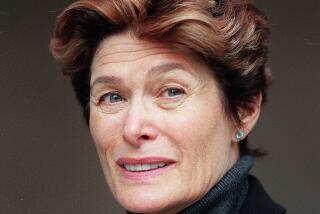Arthur P. Stern dies at 86; transistor pioneer
Arthur P. Stern, a Hungarian-born Holocaust survivor whose prominent career in electronic engineering included leading the development of General Electric’s first transistor radio in the 1950s and guiding the commercialization of satellite navigation at Magnavox in the 1970s, has died. He was 86.
Stern, a national leader in the progressive Jewish community, died of congestive heart failure May 24 at his home in Beverly Hills, said his son, Claude.
After being imprisoned in the Bergen-Belsen concentration camp in Germany, Stern trained as an electrical engineer, immigrated to the United States in 1951 and joined General Electric’s Electronics Laboratory in Syracuse, N.Y.
At GE in the early ‘50s, Stern participated in the development of the company’s first electronic color TV system before being appointed project leader to develop GE’s first transistor radio.
Stern and a coauthor wrote the first article to describe general principles and theory of transistor radio design in 1955, the same year GE’s first transistor radio was put on the market.
The first commercially produced transistor radio — the Regency TR-1, made by Texas Instruments and Industrial Development Engineering Associates — was introduced in late 1954.
Stern “was a pioneer in transistor circuit design and development,” said Jerome J. Suran, who managed the advanced circuits group in GE’s Electronics Laboratory in the late ‘50s.
“At that time, there were maybe 50 to 100 of us throughout the country that were very actively working in that field,” Suran told The Times. “It was kind of a race, and he certainly was one of the leading pioneers in this development.”
Alexander Magoun, outreach historian at the IEEE History Center at Rutgers University in New Brunswick, N.J., said: “The fact that Stern was contributing to the early development of two essential technologies for the 20th century” — color television and transistor technology — “suggests he was a man who knew how to take advantage of technology opportunities and hints at what he did later in his career.”
Stern served on the board of directors of IEEE, a leading professional association dedicated to technological innovation and as its president in the 1970s.
At GE, Stern became manager of the Electronics Laboratory’s advanced circuits group and in 1957 was named manager of the Electronic Devices and Applications Laboratory.
After leaving GE in 1961, he served as director of engineering at Martin-Marietta’s Electronics Division in Baltimore. After a merger, he became director of engineering and then director of operations of a subsidiary, Bunker-Ramo Corp.
In 1966, Stern was appointed vice president of the Magnavox Co., where he guided development of spread-spectrum systems, which are used for secure wireless communications. He also led the introduction of satellite navigation to commercial ships and navies worldwide.
He retired as vice chairman of Magnavox and president of Magnavox Advanced Products and Systems Co. in 1991.
The son of a wealthy lumber merchant, Stern was born in Budapest on July 20, 1925.
He was studying law at the University of Budapest when the Germans occupied Hungary in 1944; he and his family were deported to the Bergen-Belsen concentration camp.
After they were sent to a refugee camp in Switzerland near the end of the war, Stern studied at the University of Lausanne and then at the Swiss Federal Institute of Technology, where he earned his electrical engineering degree in 1948. He received a master’s degree in the subject from Syracuse University in 1955.
Stern was involved in numerous Jewish organizations. Nationally, he served as a director and regional co-chairman of Americans for Peace Now and was on the national board of the Jewish Council for Public Affairs.
He also served on the board of directors of the Southern California Region of the Progressive Jewish Alliance and the Southern California Americans for Democratic Action, and he was chairman of the California Humanitarian Foundation of Holocaust Survivors.
In addition to his son Claude, Stern is survived by his wife of 59 years, Edith; his son Daniel; his daughter, Jacqueline Bellowe; his brother, Robert; and seven grandchildren.
More to Read
Start your day right
Sign up for Essential California for the L.A. Times biggest news, features and recommendations in your inbox six days a week.
You may occasionally receive promotional content from the Los Angeles Times.



















































